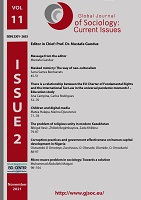The problem of religious unity in modern Kazakhstan
The problem of religious unity in modern Kazakhstan
Author(s): Bibigul Vasic, Zhibek Begimbayeva, Zada KhibinaSubject(s): Islam studies, Comparative Studies of Religion, Politics and religion, Eastern Orthodoxy, Sociology of Religion
Published by: Birlesik Dunya Yenilik Arastirma ve Yayincilik Merkezi
Keywords: Religious and ethnic tolerance; SAMK; ROC; religious expectations; terrorism;
Summary/Abstract: The respect for religious diversity that Kazakhstan promotes appears to be under strain at home. Kazakhstan’s legislation guarantees equal treatment of all religions, but acknowledges the historical role of Hanafi Islam and the Russian Orthodox Church. The purpose of the article is to highlight the results of an analytical and comparative study of religious communities operating in the territory of modern Kazakhstan. A comparative method is used as the main method in the classification, typology, assessment and generalisation of religious communities. In general, the presented analytical data should be related to comparative religious studies. Both are so-called traditional religions that have been present in the Kazakh territory for many centuries. Authorities seem unwelcoming of ‘new’ religious movements that have gained followers in Kazakhstan in recent years. However, due to the rise of religious extremism and terrorism around the world, religious tensions were found here. The study concluded that since gaining independence, religious activity in Kazakhstan has increased.
Journal: Global Journal of Sociology: Current Issues
- Issue Year: 11/2021
- Issue No: 2
- Page Range: 79-87
- Page Count: 9
- Language: English

